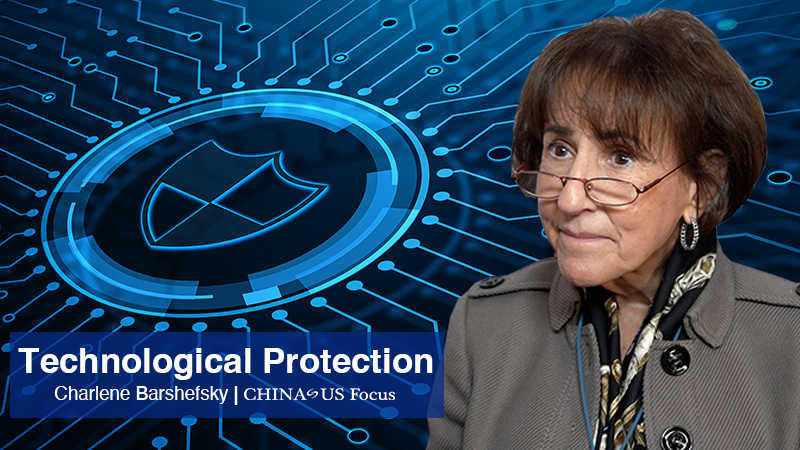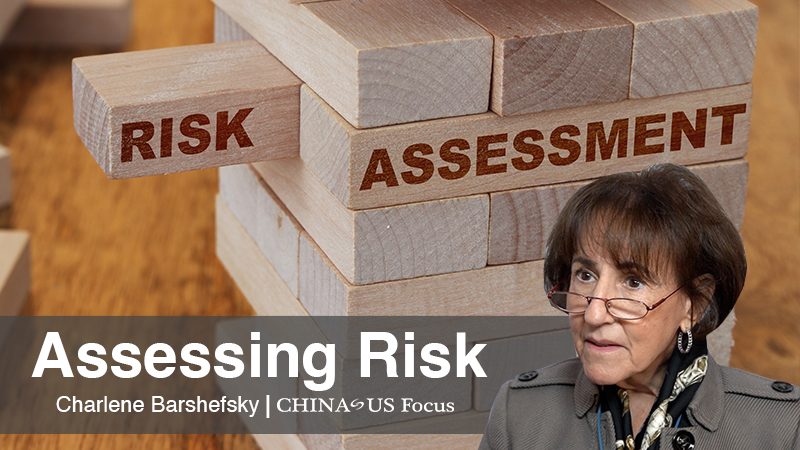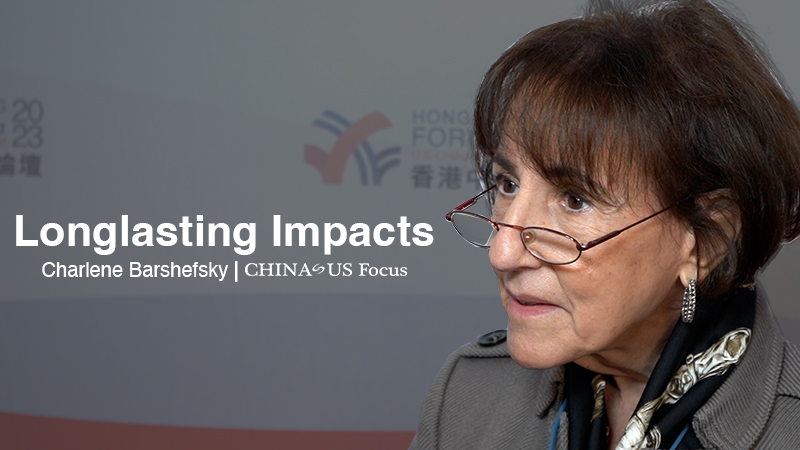Charlene Barshefsky, former United States Trade Representative, discusses in this interview with China-US Focus the lengthy negotiation process for China's entry into the WTO and its lasting impacts on China's economy, global integration and U.S.-China relations. She emphasizes the significance of international businesses having a presence in China and the considerations they need to evaluate whether to expand into the Chinese market. Both China and the U.S. believe protecting certain technologies is necessary for national security, she says, but she hopes this doesn’t swallow up economic activity. This interview was part of a special series of conversations with speakers at the 2023 Hong Kong Forum on U.S.-China Relations. Click to watch the full interview here.
KJ Kerr, China-US Focus:
Ambassador Barshefsky, thank you so, so much for being here with us today. First off, during your tenure as the United States Trade Representative, you played a pivotal role in negotiating China's entry into the World Trade Organization. We are wondering: How do you view the long-term impact of China's entry into the WTO? And what insights can you share from your experiences that may be relevant to today's bilateral economic relationship?
Charlene Barshefsky:
Well, first of all, it's such a great pleasure to be here. I know the forum was inaugurated by my dear old friend, C.H. Tung — Tung Chee-Hwa. And so it is really a matter of great pride for me that I am here, particularly in his honor.
You know, negotiating China's WTO entry was a very lengthy process, both for the Chinese side and the U.S. side — very detailed, very difficult, but always in the spirit of wishing to reach an agreement that could be mutually beneficial, not only bilaterally [but] globally as well. And, of course, the Chinese-side was very ably represented. The U.S.-side worked very hard to try and match the Chinese expertise and determination. I think, for China, the result of WTO accession is still visible today. It propelled its economy forward. It propelled China's reform and opening-up. It helped to integrate China into the global economy, making it a critical feature of that economy. And it strengthened U.S.-China bilateral relations in many ways quite beyond simply trade and economic policy.
I think as we look at it today, we see a couple of different shifts that have occurred. One, of course, is geopolitical. That is to say, a China that has become very ambitious, as great nations are, but in ways that for the U.S. and many Western countries has become difficult. And so that is going to have to be sorted out over time — hopefully, in a positive and constructive way. But I think on the trade and economic side, what we have seen is that, rather than a continuing convergence with market economy norms, as predicted by WTO accession, we see a divergence from those norms as China's economic system has changed over the intervening years. And that also poses challenges, I think, not just bilaterally but also globally. That also has to be sorted out in a constructive way. And I do think there are ways to do that. Hopefully, the two sides, as well as other countries can enter into a kind of informal negotiation to sort through these issues and see if we can find some resolution. But I think net-net, China's participation in the WTO is very positive for it and for the global economy. And so we look forward to that construct being further reinforced over time.
KJ Kerr:
Thank you very much. Looking at international businesses, what do you think are some of the main issues that some of these international businesses need to consider when determining whether to maintain or expand their presence in the Chinese market, which has become particularly complex over the last few years?
Charlene Barshefsky:
Yes, it has become complex, but I think for business generally — put aside for a moment the geopolitical overlay — for business generally, a predictable regulatory and legal environment is the single most important factor. If regulations change without notice, if the legal environment becomes idiosyncratic in nature, if business doesn't have confidence that the rules under which it operates today will exist tomorrow in the same form and in the same legal construct, it's very difficult for a business to remain in a country. It's very difficult for a business to expand further in that country, as it will naturally seek to mitigate risk and diversify outside the country at issue. So for business, consistency, regularity, transparency and a system in which they feel confident doing business are the most critical factors. If we have the geopolitical overlay, of course, for businesses — both U.S. and Chinese businesses — there is a certain political and governmental pressure, which is not a welcome addition to doing business, but is nonetheless now a feature. It's a reality. And businesses have to navigate that, again, as they assess risk.
Click to watch the full interview here.
KJ Kerr:
Absolutely. What do you think is the significance of international businesses — particularly American businesses — being in China and having a presence there?
Charlene Barshefsky:
Well, I think having a presence in China is critical for growth, for the size of the market, for the positive competitive aspect of being in markets that are difficult, that are markets that are quite discerning. You want to be in those markets because it helps you improve. And so business needs to be in China in a way that, from a risk perspective, is comfortable for them. And I think businesses will continue to be in China. They'll continue to invest in China. That seems quite natural and appropriate.
KJ Kerr:
Transitioning a bit, how should the U.S. and China approach their trade and economic relationships with other Indo-Pacific nations?
Charlene Barshefsky:
Hopefully, on a more cooperative basis, because fragmentation of the global economy, which is happening, is not a particularly positive trend. It's not positive for growth. It's not positive for global relations. I think we would like to see — or I would like to see, I should say — an environment that is conducive to both countries operating in a more cooperative manner, particularly in the Indo-Pacific. This is the epicenter of growth globally. But it is also the epicenter of a variety of flashpoints globally, and so both countries being in the region in a compatible way is of the utmost importance.
KJ Kerr:
How do you think the recent increases in U.S. export controls on semiconductors and artificial intelligence chips to China may influence trade dynamics between the two countries?
Charlene Barshefsky:
Both countries have a view of their national security. The U.S. view is encapsulated by the phrase "high wall, small yard," meaning there are certain technologies the U.S. wishes to protect. That's a relatively small yard, because the U.S. definition of national security is quite narrow. High fence means to really protect those few technologies. China similarly has wanted to be self-sufficient in technology, self-reliant in technology. And so its yard is rather larger and the walls are just as high. This is problematic for various reasons, but each country believes it necessary for the protection of their own national security. I don't see that changing in any significant degree.
What I would hope is that these definitions of national security don't expand so much that they swallow up economic activity between the two countries. This kind of approach, of course, fragments the global economy and fragmented technology raises questions in the long-run about interoperability. This raises the question further whether other countries will lean toward one side or the other, further fragmenting the digital commons. And that also poses enormous challenges for both countries, for both the U.S. and China. So again, I think the two sides now are beginning to talk about these issues, which is extremely welcome. And, hopefully, they can reach some common understanding, at least about not letting security concerns so overwhelm economic concerns that the relationship is swallowed by them.

Click to watch the full interview here.
KJ Kerr:
Thank you so much. We are so grateful to you for sharing those insights with us. Last, we'd love to talk a bit about CUSEF's 15th anniversary. I think this is a huge part of our work and what we do — providing opportunities to engage in discussion, to foster communication. So we would love for you to share perhaps your experience working with CUSEF, or even your thoughts on the significance of CUSEF's work, such as the forum, people-to-people exchanges and fostering communication during this time of increased tensions.
Charlene Barshefsky:
Well, this forum and these dialogues are a critical feature of the landscape now. And they are critical to forming an ecosystem where the two sides continue to engage, continue to talk, continue to try and work toward the resolution of issues. The prestige of the forum is very well known. It is so well-regarded that it provides a critical focal point for a lot of these efforts. So I am thrilled to be back, thrilled to be here and of course thrilled to be in Hong Kong again, needless to say, and just delighted to see this forum go from strength to strength, because the world needs it. And most assuredly the U.S. and China need it.

